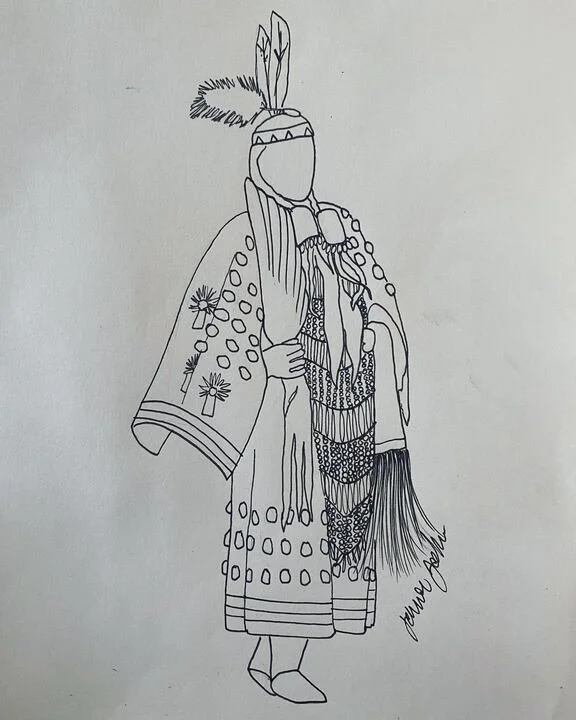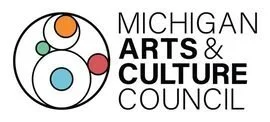The Whole Field • Volume 2 • No. 7 • Full Moon • April 6th, 2023
“Shapeshifter, Land Defender”
Block print on rice paper • 12" x 9" • 2023 • Jamie John
In This Issue: A Q&A with Jamie John, The Alluvion, and Land Back.
Below is an Excerpt from “Crossing Cultures”
A Q&A with Jamie John, a local artist whose work explores concepts around identity, autobiography, Indigeneity, and relationships to land and water.
…You wrote a poem that explores some of that history and needed mending. The sketches incorporated throughout this Q&A were originally drawn for that very booklet. Could you share more about Transgender Water Carrier, and the process of self-publishing a zine? [Note. all copies of T.W.C. have been sold. A second printing is in the works.]
The poem Transgender Water Carrier draws on my relationship to the element of water. I’m Indigenous to the Great Lakes region and I went through ceremony to become a water carrier before I finished elementary school. Water carrying is typically a responsibility of Anishinaabe women, with fire keeping being the responsibility of our men. Being 2spirit person I learned to carry water first and learned how to tend fire as I furthered my transition and gender journey. Along the way I learned more and more about gender expansive and gender variant Anishinaabe people and historical figures. Still today I am decolonizing my understanding of gender and relationships and working to undo my ideas of sexuality, gender expression, and gender presentation.
My connection to water and my need to care for and respect her reminds me of this: queerness is also an ability to shapeshift: we pour water into all kinds of vessels and she takes shape to fit all of them. Water is in everything, water is required for life. Water is the lifeblood of the Earth. Even just within my lifetime I’ve seen water continually be disrespected, harmed, polluted, and commodified. I’ve seen the land be cut up into private property and sold to the highest bidder. And I think of the prophecy given to water walker and water protector, Josephine Mandamin, who said that an ounce of water will cost more than an ounce of gold by the year 2030. This prophecy propels me to protect and defend the water and land in a way that honors what they’ve been through as well.
I chose to self-publish because I think part of me still struggles with relinquishing control over stories so close to me. Self-publishing allows for a sense of autonomy that I like having when talking about Native and trans and queer stories. I’m still learning about zines and how to make them but I really look forward to making more zines in the near future. My big dream is to use the text of Transgender Water Carrier for a short film I’d like to make as I feel those poems/zines speak to both the ongoing and constant land destruction and the onslaught of recent anti-trans legislation being enforced…
The Warp — Ideas and Inspiration
|| 1 || A selection Jamie’s artwork is currently on display at Commongrounds, along with a handful of other artists. That means that you can take a look in person as you stop in for an event at the Alluvion, the state-of-the-art music and performance venue Crosshatch has been envisioning and co-creating for the past few years. While it’s still in preview series mode, that doesn’t mean it’s under wraps. These events are hitting stage this month, and, yes, preview-series be darned, there are some heavy hitters.
Speaking of, May Erlewine’s April 14th show sold out fast. Here are some of her words on the setting that she helped envision into existence:
“This space will support young and emerging artists right here in our community. Our kids and our grandkids will have a space to experiment, to connect with each other, and be seen as the artists they are becoming.
This is how a community becomes an art community. We nurture it. We make space for it. We honor it, and by doing that, we make something happen here that is unlike anything else in the region.”
|| 2 || What are the mechanics of Land Back? As Jamie says, it’s both simple and complex. Regardless of your familiarity with the Land Back movement, which advocates for the return of lands and related decision-making to their previous indigenous occupants, a question looms—how do you make that happen?
Observation one—just because something is difficult doesn’t mean it isn’t needed. Observation two—a weighty consideration is taking care that we’re listening to, taking cues from, and allowing decision-making from the right folks. How does Land Back happen, and what does it look like in the real world? I recommend reading this High Country News take from B. “Toastie” Oster, a journalist, writer, and Choctaw citizen. An excerpt follows:
”The LandBack movement is less about a mass real estate transaction than it is about sovereignty, recognition of treaties, and, ultimately, the abolition of the United States’ concept of real estate altogether. From many traditional Indigenous points of view, land ownership is an illusion, no more possible than ownership of a rainbow. Land “ownership” is simply a legal concept — one that keeps wealth and power in white families.
Think of it this way: As a landowner, what you really own is a title. That’s just a piece of paper. But the courts will recognize that paper in case of any dispute. What’s more, they’ll enforce it through police violence. So-called “landowners” may have access to violent state force, but they still don’t really own the land. Don’t take it too hard, though. Nobody owns rainbows, either!
Many Indigenous civilizations recognized private property in the form of houses and personal belongings, while land itself remained communal. This economic structure was stable and egalitarian, free of many of the ills European-American thought has foisted upon this land, such as homelessness and neo-feudalism. True LandBack would reflect this.”
If you glazed over those words (you shouldn’t,) consider clicking here to watch Hesapa—A Landback Film, a five-minute video highlighting a 2020 Land Back direct action in South Dakota’s Black Hills.
And, yes. Of course. You can simply ask a Native American for their thoughts. That isn’t without strings. Know that you’re putting someone on the spot with a complex and loaded question, and by asking, you’re committing to listen.
The Weft — News and Events
|| 1 || Lois Beardslee: Anishinaabe Author Speaks from a Socioeconomic Perspective. At 7pm on Thursday, April 13th, Lois Beardslee will be speaking at the Dennos Museum’s Milliken Auditorium. Here’s some of their write-up:
“Please join us for an evening with award-winning author and illustrator Lois Beardslee. A recipient of the prestigious Michigan Notable Book Award along with a silver medal from the Midwest Book Awards, Beardslee's writings grapple with contemporary issues ranging from climate change to socioeconomic inequality. This event is general admission. Following the lecture, please join us for a post reception on the Museum side.
Please be sure to visit the Traverse Area District Library locations for more information and to check out books by Lois Beardslee. Her works will be on display at the library on Woodmere Ave along with a selection of books by other indigenous and women poets through the end of April.”
The event is free. Register in advance here—capacity will be limited.
|| 2 || May Erlewine Show at the Alluvion. May 14th, 7pm. As we mentioned, this one already sold out, and quickly. May will be bringing her full band, and some very special guests to celebrate her first performance on The Alluvion stage. Keep tabs on other upcoming events at the Alluvion here, or by following along at The Alluvion Facebook page.
|| 3 || Empty Bowls is Back! I haven’t had the chance to attend, so here’s the description from the official website—Empty Bowls is a fundraiser that supports food security in Northwest Michigan. Proceeds will be used to purchase healthy produce and protein from local farms for distribution to the Northwest Food Coalition’s 75+ food banks and emergency meal sites. Event attendees will receive a handmade artisan bowl to take home along with a simple lunch of soup and bread and fellowship with other community members who support our cause.
You can buy tickets at this link.
|| 4 || If you have the means, please consider supporting the Pierce family. Tim, Stephanie and Hazel experienced a tragedy: Their shop—a place of craft, care, and creativity—was destroyed by fire. Please join us in supporting them as they recover from this loss. Aside from being a lovely family, Tim has led workshops for XH in the past. Find their Gofundme here.
|| 5 || You might be wondering what’s happening with the Northern Michigan Small Farm Conference. There’s too much to detail here, but we’ll share this snippet—August, Antrim County, ten to fourteen farms and other facilities, hands-on and classroom workshops, travel from farm to farm, and social time. We’re excited! Click here to follow along, and watch for more news in upcoming months.
|| 6 || Farming is a highly unpredictable, hazardous, and stressful occupation, and this is why Michigan State University (MSU) Extension is committed to supporting agricultural professionals. These professionals face tough decisions that affect their families, livelihoods, operations, and farms.
MSU Extension has a team of over 20 dedicated professionals who combine expertise in farm business management with mental and behavioral health. They provide innovative resources and support, such as teletherapy, financial services, free online education, and community presentations. These tools are not limited to farmers but are also available to farm workers, local farm organization chapters, veterinarians, Farm Bureau members, county commissioners, and other key stakeholders in agriculture and agribusiness. To learn more, click here.
sponsored by:
Desmond Liggett Wealth Advisors is a mission-driven, fee-only wealth management company with a simple purpose: to generate exceptional value for the individuals, families, small business owners, and non-profit organizations they serve. Desmond Liggett Wealth Advisors believe in and adhere to triple-bottom-line analysis for portfolio investments, ensuring that they review how a company’s environmental and social values impact its long-term resilience and, consequently, value.
Many thanks to the Michigan Arts & Culture Council and the National Endowment for the Arts for their support of this work.
Crosshatch’s The Whole Field is a biweekly newsletter. We aim to provide content that’s engaging, thought-provoking, and worth your time. If you’ve been forwarded this email, and want to receive future editions, click here to subscribe to our mailing list or view previous editions.
We also envision this best as a collaborative work. If you have any suggestions, leads or feedback, we appreciate your reply directly to this email.
Copyright (C) 2023 Crosshatch. All rights reserved.










